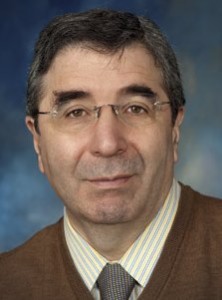SPEAKER BIOS and ABSTRACTS (A - L)
(Loading times may vary, please be patient while the page loads)
Ranjan Duara, MD
Program Director
 Dr. Ranjan Duara is the Medical Director of the Wien Center for Alzheimer’s Disease and Memory Disorders at Mount Sinai Medical Center in Miami Beach. He is a Professor of Neurology at the Herbert Wertheim College of Medicine (Department of Neurology) at Florida International University and is affiliated with the University of Miami, Miller School of Medicine, Miami, Florida (Depts. of Medicine, Neurology and Psychiatry). He completed internal medicine and neurology residencies in India, the United Kingdom and at Thomas Jefferson University Hospital in Philadelphia, and did a fellowship in neuroscience and neuroimaging at NIH.
Dr. Ranjan Duara is the Medical Director of the Wien Center for Alzheimer’s Disease and Memory Disorders at Mount Sinai Medical Center in Miami Beach. He is a Professor of Neurology at the Herbert Wertheim College of Medicine (Department of Neurology) at Florida International University and is affiliated with the University of Miami, Miller School of Medicine, Miami, Florida (Depts. of Medicine, Neurology and Psychiatry). He completed internal medicine and neurology residencies in India, the United Kingdom and at Thomas Jefferson University Hospital in Philadelphia, and did a fellowship in neuroscience and neuroimaging at NIH.
Dr. Duara’s research has focused primarily on early diagnosis of Alzheimer’s disease and other dementias, neuroimaging, genetic epidemiology and the methodology for staging the transition from normal cognitive aging to dementia. He has contributed to over 200 articles in peer-review scientific journals as well many book chapters.
He is the Principal Investigator for the State of Florida Alzheimer’s Disease Initiative Brain Bank. He has also been an investigator in numerous clinical trials of novel agents for the treatment of Alzheimer’s Disease.
Rebecca Amariglio, PhD
Speaker – MiniSymposium 2
 Dr. Rebecca Amariglio (pronounced Amarilio) is a practicing Clinical Neuropsychologist at Brigham and Women’s Hospital and Junior Faculty at Harvard Medical School in the Department of Neurology.
Dr. Rebecca Amariglio (pronounced Amarilio) is a practicing Clinical Neuropsychologist at Brigham and Women’s Hospital and Junior Faculty at Harvard Medical School in the Department of Neurology.
Her research focus is in the early detection of Alzheimer’s disease (AD) using sensitive cognitive and functional measures. In particular, she is interested in the role of subjective memory complaints as a potential early indicator of Alzheimer’s disease.
She is a recipient of the New Investigator Research Award from the Alzheimer’s Association and the Career Development Award from the National Institute on Aging to further investigate her area of interest. She is also part of an international working group, supported by the Alzheimer’s Association, to develop universal criteria for defining subjective memory decline in the context of Alzheimer’s disease.
Subjective Cognitive Concerns and Biomarker Evidence of Preclinical Alzheimer’s Disease
Rebecca Amariglio
Massachusetts General Hospital/Brigham and Women’s Hospital, Boston, USA
Prior to the onset of overt clinical impairment due to Alzheimer’s disease (AD) it is difficult to identify individuals who are in the preclinical phase. This is a phase when clinically normal individuals demonstrate evidence of amyloidosis, neuronal injury, and subtle cognitive decline. Standardized cognitive measures are not typically able to detect changes so early in the disease course. Accumulating evidence suggests that self-reported subjective cognitive concerns may reflect initial functional changes due to AD. This talk will present data demonstrating a relationship between increased subjective cognitive concerns and biomarker positivity for AD, such as amyloid burden and neurodegeneration. Additionally, the impact of other factors such as APOE genotype, depressive symptoms, and demographic factors will be discussed.
David A. Bennett, MD
Keynote Speaker – Symposium
 Dr. David A. Bennett is the Director of the Rush Alzheimer’s Disease Center and the Robert C. Borwell Professor of Neurological Sciences at Rush University Medical Center in Chicago. He is principal of several grants from the NIH including the Alzheimer’s Disease Core Center, the Religious Orders Study and the Rush Memory and Aging Project. His pioneering analytic prospective clinical-pathologic cohort studies have linked a wide range of genomic, experiential, psychological and medical risk factors to the development of AD and other common chronic conditions of aging. His studies include the investigation of peripheral blood biomarkers, ante- and post-mortem neuroimaging, biomedical devices, neuropathology and neurobiologic indices, as well as deep omics including epigenomics, transcriptomics, proteomics, and metabolomics. Data and biospecimens from his studies are being used to support a nationwide drug discovery pipeline. Dr. Bennett has more than 550 peer-reviewed manuscript publications, with more than 55,000 citations and an h index=111.
Dr. David A. Bennett is the Director of the Rush Alzheimer’s Disease Center and the Robert C. Borwell Professor of Neurological Sciences at Rush University Medical Center in Chicago. He is principal of several grants from the NIH including the Alzheimer’s Disease Core Center, the Religious Orders Study and the Rush Memory and Aging Project. His pioneering analytic prospective clinical-pathologic cohort studies have linked a wide range of genomic, experiential, psychological and medical risk factors to the development of AD and other common chronic conditions of aging. His studies include the investigation of peripheral blood biomarkers, ante- and post-mortem neuroimaging, biomedical devices, neuropathology and neurobiologic indices, as well as deep omics including epigenomics, transcriptomics, proteomics, and metabolomics. Data and biospecimens from his studies are being used to support a nationwide drug discovery pipeline. Dr. Bennett has more than 550 peer-reviewed manuscript publications, with more than 55,000 citations and an h index=111.
What have we Learned from Brain Autopsies of Persons with and without Dementia (Forum)
David Bennett
Rush University Alzheimer’s Disease Center, Chicago, USA
This talk will introduce two cohort studies of older persons without dementia all of whom are brain donors. It will review the pathologies commonly found in an aging brain. The concept of neural reserve will then be introduced. This will be followed by data that highlight factors that increase or decrease the vulnerability of the brain to the pathology of Alzheimer’s disease. Finally, it will discuss what we can do to build a better brain as we age.
Genes, AD Pathology, Cerebrovascular Disease, and AD Dementia (Keynote)
David Bennett
Rush University Alzheimer’s Disease Center, Chicago, USA
This talk will introduce two cohort studies of older persons without dementia all of whom are brain donors. It will review the neurobiology of AD dementia. Then we will discuss genomic variants associated with AD dementia. This will be followed by a discussion of the neurobiologic pathways linking genes to AD dementia with an emphasis on AD pathology, cerebrovascular disease, and inflammation/immune function.
Howard Chertkow, MD
Speaker – Workshop
 Dr. Howard Chertkow is a practicing cognitive neurologist at the Jewish General Hospital of McGill University in Montreal Canada, where he helped found and direct Canada’s largest memory clinic.
Dr. Howard Chertkow is a practicing cognitive neurologist at the Jewish General Hospital of McGill University in Montreal Canada, where he helped found and direct Canada’s largest memory clinic.
Dr. Chertkow’s major areas of research interest include 1) Early diagnosis of Alzheimer’s Disease and prediction of deterioration in individuals with Mild Cognitive Impairment, 2) the structure, organization, and function of the semantic memory component of long term memory, and its deterioration in dementia, 3) localization of language and memory functions in the brain using functional imaging, and 4) therapy of anomia using neuromodulation approaches.
His CV lists 270 publications, including 170 peer-reviewed articles and chapters. Twelve of his publications have over 100 citations, and three of the publications have been cited over 1000 times. In 2005 he and his colleagues, Ziad Nasreddine and Natalie Phillips, published the Montreal Cognitive Assessment (MoCA), which has become an international standard for diagnosis of MCI, and has been cited over 3000 times. The MoCA is now used around the world to screen for cognitive loss in the elderly. Thompson Reuters’ Essential Science Indicators noted this to be the most cited paper in mild cognitive impairment, 2006-2009.
In 2014 Dr. Chertkow was elected to the Canadian Academy of Health Sciences. Dr. Chertkow is the new Scientific Director for the Canadian Consortium on Neurodegeneration in Aging (CCNA), a national organization established by the Canadian government in 2014. CCNA brings together the entire Canadian dementia research community to establish national teams and platforms to produce breakthroughs in the diagnosis and treatment of the dementing illnesses.
A Canadian Consensus: Defining MCI for Clinical and Research Purposes
Howard Chertkow
McGill University and General Jewish Hospital, Montreal, Canada
In Canada, expert physicians have come together multiple times to hammer out consensus positions on diagnosis and treatment of MCI/Prodromal AD. This is particularly important in a single-payer system where the government must approve all payment for diagnosis (e.g., PET scanning) and therapy (e.g. medications for MCI patients). For example, cholinesterase inhibitors for MCI have never been approved and are hence never offered in Canada. In addition, the recent establishment of the Canadian Consortium on Neurodegeneration in Aging has led to the recent creation of a national research cohort of MCI individuals in whom diagnostic criteria had to be instantiated. In this talk, the unique and (hopefully) evidence-based Canadian positions on MCI will be presented.
Colm Cunningham, PhD
Speaker – MiniSymposium 1
 Dr. Colm Cunningham is a Neuroscientist with a specific interest in how systemic inflammation affects brain function. After a PhD in Neurochemistry (1998), with K.F. Tipton in Trinity College Dublin (TCD), Colm pursued post-doctoral research in experimental neuropathology with Prof. Hugh Perry (University of Southampton, UK). His post-doctoral work examined the microglial response to chronic neurodegeneration and together they discovered microglial priming and described the acceleration of neurodegenerative disease by systemic inflammation.
Dr. Colm Cunningham is a Neuroscientist with a specific interest in how systemic inflammation affects brain function. After a PhD in Neurochemistry (1998), with K.F. Tipton in Trinity College Dublin (TCD), Colm pursued post-doctoral research in experimental neuropathology with Prof. Hugh Perry (University of Southampton, UK). His post-doctoral work examined the microglial response to chronic neurodegeneration and together they discovered microglial priming and described the acceleration of neurodegenerative disease by systemic inflammation.
In 2006 he was awarded a Wellcome Trust Career Development Fellowship to establish the first animal models of delirium during dementia and in 2010 was awarded a Wellcome Trust Senior Research Fellowship to further this work, publishing several influential papers in this area between 2005-2015 (Biological Psychiatry, Journal of Neuroscience, Neurobiology of Aging, Nature Reviews Immunology). Dr. Cunningham has since taken up a permanent post as Assistant Professor in Neuroscience in TCD. His work for some years has concerned the impact of systemic inflammation on the normal and diseased brain. The interaction between prior neurodegenerative pathology and superimposed secondary insults in delirium and long-term cognitive decline is now the major focus of his work.
Systemic Inflammation Triggers Acute Delirium, Brain Injury and Contributes to Accelerated Neurodegeneration
Colm Cunningham
Trinity College, Dublin, Ireland
Systemic inflammation has exaggerated effects in the vulnerable (neurodegenerating) brain. This may be best exemplified by the high prevalence and deleterious outcomes of delirium triggered by infection, trauma and surgery in the elderly or cognitively impaired.
Exploiting this phenomenon by systemically applying bacterial endotoxin (LPS; lipopolysaccharide) to 3 discrete neuropathological models (chronic synaptic loss, chronic hypocholinergia, beta-amyloidosis) has lead to plausible model systems to study delirium during dementia.
These models are beginning to offer mechanistic explanations of acute cognitive dysfunction such as delirium and to assist in interpretation of multiple observations in the delirium and dementia clinical biomarker literature and have also made predictions that have been successfully tested in epidemiological cohorts.
Data presented in this talk will demonstrate that systemic inflammation, induced by LPS, impacts upon cognitive function by multiple dissociable IL-1-dependent mechanisms and also triggers acute IL-1-dependent neuronal injury/death that is dissociable from the transient cognitive dysfunction. These models offer potential routes to mitigation of the effects of systemic inflammation on dementia.
Charles DeCarli, MD
Speaker – MiniSymposium 1
 Dr. Charles DeCarli, MD, is Professor of Neurology at the University of California in Davis, California and recipient of the Victor and Genevieve Orsi Chair in Alzheimer’s Research. He is the Director of the UC Davis Alzheimer’s Disease Center, a United States National Institutes of Health funded Alzheimer’s research center. Dr. DeCarli is also Director of the Imaging of Dementia and Aging (IDeA) laboratory.
Dr. Charles DeCarli, MD, is Professor of Neurology at the University of California in Davis, California and recipient of the Victor and Genevieve Orsi Chair in Alzheimer’s Research. He is the Director of the UC Davis Alzheimer’s Disease Center, a United States National Institutes of Health funded Alzheimer’s research center. Dr. DeCarli is also Director of the Imaging of Dementia and Aging (IDeA) laboratory.
His research focuses on using advanced structural and functional brain imaging to study normal aging, mild cognitive impairment and dementia and the role of genetics, cerebrovascular and Alzheimer’s disease on these processes.
Dr. DeCarli has published over 300 peer-reviewed journal articles in high impact journals such as Brain, Lancet Neurology and Nature Genetics. He is a recipient of the J. Allyn Taylor International Prize in Medicine—Imaging of the Aging Brain in recognition of his work. In addition, he is the Editor-in-Chief of Alzheimer Disease and Associated Disorders, an international journal of AD research.
Impact of Vascular Risk Factors on Cognition Independent of Amyloid and MRI Measures of AD and CVD
Charles DeCarli
University of California – Davis, Davis, USA
Alzheimer’s and vascular disease are two common causes of cognitive decline among older individuals. The recent advent of amyloid imaging in combination with MRI markers of vascular brain injury and AD-associated neurodegeneration and detailed medical history allows for in vivo assessment of the combined influence of vascular and Alzheimer’ s disease on cognitive decline. Recent work by our group finds evidence that vascular brain injury is significantly associated with cognitive ability independent of amyloid load among individuals selected for high vascular risk. We present an extension of this work by examining the impact of vascular risk factors, vascular brain injury, AD-associated neurodegeneration, and amyloid load in a community based cohort more representative of the general population.
Steven DeKosky, MD
Chair & Moderator – Forum
 Dr. Steven DeKosky is the Aerts-Cosper Professor of Alzheimer’s Research and Deputy Director of the McKnight Brain Institute at the University of Florida College of Medicine, positions to which he was appointed in July 2015. He also serves as Associate Director of the newly funded Florida Alzheimer’s Disease Research Center.
Dr. Steven DeKosky is the Aerts-Cosper Professor of Alzheimer’s Research and Deputy Director of the McKnight Brain Institute at the University of Florida College of Medicine, positions to which he was appointed in July 2015. He also serves as Associate Director of the newly funded Florida Alzheimer’s Disease Research Center.
From 2008 to 2013 Dr. DeKosky was Vice President and Dean of the University of Virginia School of Medicine and held the James Carroll Flippin Professor of Medical Science; he also served as Physician-in-Chief of the University of Virginia Health System.
From 1992-2000 he was Director of the Division of Geriatrics and Neuropsychiatry in the Department of Psychiatry and 2000 he became Professor and Chair of the University of Pittsburgh Department of Neurology, a position which he held until he moved to the University of Virginia in 2008. Dr. DeKosky was Director of Pitt’s NIH-funded Alzheimer’s Disease Research Center (ADRC) from 1994-2008.
His basic research centers on structural and neurochemical changes in human brain in aging and dementia and effects of traumatic brain injury. His clinical and translational research have centered on understanding the genetics, neuropsychiatric symptoms, neuroimaging, and treatment and prevention of AD. Beginning trauma studies as a Principal Investigator in the University of Pittsburgh Brain Trauma Research Center in 1992, he studied similarities in the injury cascades of TBI and AD. He was an author of the first reports of Chronic Traumatic Encephalopathy (CTE) in American professional football players, as well as a Principal Investigator in the initial clinical studies of the breakthrough amyloid-imaging agent Pittsburgh Compound B (PiB). He directed an 8 year NIH-funded national multicenter trial to assess whether Ginkgo biloba can prevent or delay onset of dementia in normal elderly adults, the first large study of prevention of dementia/AD.
He currently serves on the NIH’s Council of Councils; the Council that oversees the Common Fund of the NIH.
Bruno Dubois, MD
Speaker – Workshop
 Dr. Bruno Dubois is Professor of Neurology at the Neurological Institute of the University Salpetriere Hospital in Paris. He is Director of the “Institute for Memory and Alzheimer Disease” (IMMA) and of a Research INSERM Unit at the ICM (Institut du Cerveau et de la Moelle Epinière).
Dr. Bruno Dubois is Professor of Neurology at the Neurological Institute of the University Salpetriere Hospital in Paris. He is Director of the “Institute for Memory and Alzheimer Disease” (IMMA) and of a Research INSERM Unit at the ICM (Institut du Cerveau et de la Moelle Epinière).
He has published on anatomical and biochemical studies on the central cholinergic systems in rodents and humans, on cognitive neuropharmacology, and on neuropsychology in patients with dementia. He recently leads the International Working Group on the New Criteria for Alzheimer’s disease.
The Added Value of the International Working Group-2 Diagnostic Criteria for Alzheimer’s Disease
Bruno Dubois
Hôpital Pitié Salpêtrière, Paris, France
The new diagnostic criteria proposed by the IWG have introduced the biomarkers in the diagnostic framework (Dubois et al. 2007 and 2014). The reliable identification of biomarkers of AD is responsible for a major change in the conceptualization and the diagnosis of the disease. Indeed, paraclinical investigations (MRI, CSF…) are no longer proposed for only excluding other etiologies in case of a dementia syndrome. They are now proposed to be part of the diagnostic procedure. Considering that biomarkers are not linked to a stage of severity but rather to the disease process, these criteria allow us to identify Alzheimer’s disease at a prodromal/MCI stage and even at a preclinical stage of the disease.
In addition, the International Working Group emphasizes a single clinical-biological approach that includes all symptomatic phases of AD and use the same diagnostic algorithm across the spectrum of symptomatic disease consisting of:
A specific clinical phenotype. Episodic memory disorders are the keystone of the clinical syndrome of typical AD. A specific memory profile was reported in AD (Dubois et Albert, 2004): the“amnesic syndrome of the hippocampal type”, which is defined by a very poor free recall (as in any memory disorders) and a decreased total recall due to an insufficient effect of cueing. This specific syndrome can be identified by tests such as the Free and Cued Selective Reminding Test (FCSRT) which controls encoding and retrieval processes (Grober and Buschke, 1988). An amnestic presentation may not always be the case and other clinical phenotypes can be associated with postmortem evidence of AD pathology (Murray et al. 2011). Therefore, the IWG has introduced the concept of “atypical forms of AD” with specific clinical phenotypes that include logopenic aphasia, bi-parietal atrophy, posterior cortical atrophy, and frontal variant AD.
The presence of AD biomarker. Biomarkers are supportive features of a diagnostic framework that is anchored around a core clinical phenotype. The AD diagnosis, evoked in case of a specific clinical phenotype (either typical or atypical) needs confirmation from the presence of biomarkers of Alzheimer pathology: CSF changes of amyloid-beta (Aβ) and tau levels or positive amyloid-PET. The presence of these biomarkers should be required for research purposes or in the clinical settings for atypical cases.
The availability of specific in vivo biomarkers of AD pathology has moved the definition of AD from a clinical-pathological entity to a clinical-biological entity. As biomarkers can be considered as surrogate markers of the histopathological changes, the clinical diagnosis can now be established in vivo and reference to dementia may no longer be needed.
Charles Duyckaerts, MD, PhD
Speaker – MiniSymposium 1
 Dr. Charles Duyckaerts, MD, PhD, is Professor of Pathology at the University of Paris VI and head of the neuropathology laboratory at La Salpêtrière hospital. He has co-directed, at ICM (Institut du Cerveau et de la Moelle), the Inserm team “Alzheimer & Prions diseases”. Since 2005 he has been the administrator of the National Brain Bank NeuroCEB.
Dr. Charles Duyckaerts, MD, PhD, is Professor of Pathology at the University of Paris VI and head of the neuropathology laboratory at La Salpêtrière hospital. He has co-directed, at ICM (Institut du Cerveau et de la Moelle), the Inserm team “Alzheimer & Prions diseases”. Since 2005 he has been the administrator of the National Brain Bank NeuroCEB.
He was a co-chair of the scientific committee of the Alzheimer Association International Conference in Vancouver (2012) and has received the Henry Wisniewski Award for lifetime achievement in Alzheimer research (2006).
Dr. Duyckaerts is doctor honoris causa of the University of Louvain (2014).
Aging, Alzheimer Disease and Vascular Pathology: Which are the Determinants of Cognitive Impairment?
Charles Duyckaerts
Hôpital Pitié Salpêtrière, Paris, France
Mutations on the APP pathway as well as triplication of the APP gene cause Alzheimer disease. Those findings have suggested that amyloid deposition was the initial alteration in a cascade of reactions, including aggregation of hyperphosphorylated tau, inflammation, and neuronal loss, leading to cognitive impairment. However, aggregation of hyperphosphorylated tau in the entorhinal cortex and hippocampus is observed in a large proportion of the aged population and has been called “Primary age-related tauopathy” (PART). The clinical correlations of PART are still poorly known and the term PART could actually cover the initial lesions of Alzheimer disease (AD). The deposition of amyloid-beta (Aβ) in the neocortex is generally secondary to the PART phase and does not, by itself, induce dementia. The progression of tau pathology in the neocortex, following connective pathways, relies on prion-like “templated misfolding” as experimentally shown. The vascular changes are not mandatory to the development of AD and appear to develop independently from AD lesions. However, they lower the symptomatic threshold of Aβ and tau pathologies, and may be major contributors to early cognitive deficit as shown in the CFAS study. Small vessel disease is in this respect more meaningful than large infarcts. It has also been suggested that changes in the vessel walls could impede Aβ resorption and thus increase amyloid deposition. In conclusion, cognitive deficit is the result of several pathological mechanisms, tau pathology and small vessel disease being probably the major determinants. The chronological and causal relationship between amyloid deposition and tau pathology during aging remains a controversial issue.
Mary Ganguli, MD, MPH
Chair – MiniSymposium 2 & Speaker – Forum
 Dr. Mary Ganguli is a geriatric psychiatrist and psychiatric/neuroepidemiology at the University of Pittsburgh, where she teaches residents, fellows, and graduate students. She provides geriatric psychiatry outpatient services at the University of Pittsburgh Medical Center.
Dr. Mary Ganguli is a geriatric psychiatrist and psychiatric/neuroepidemiology at the University of Pittsburgh, where she teaches residents, fellows, and graduate students. She provides geriatric psychiatry outpatient services at the University of Pittsburgh Medical Center.
She has been conducting population- based studies of cognitive impairment and dementia since 1987. She served on the Neurocognitive Disorders Work Group of DSM-5, and is a member of the AAN Practice Parameter Work Group on MCI. She previously served on the National Advisory Council on Aging. She is Associate Editor of the Journal of the American Geriatrics Society and of International Psychogeriatrics, and an Editorial Advisory Board member of Alzheimer Disease and Associated Disorders.
The Link between Depression, Anxiety and Alzheimer’s Disease
Mary Ganguli
University of Pittsburgh, Pittsburgh, USA
Alzheimer Disease (AD) becomes increasingly common as we grow older. Anxiety and depression are common throughout adulthood. Questions about the relationship of AD to depression and anxiety are usually about which comes first (“the chicken or the egg?”). The answer seems to be “both.” People who experience anxiety and depression early in life may have a higher chance of showing signs of AD when they get older, compared to those who have never been anxious or depressed. It is possible that getting timely and appropriate treatment for anxiety and depression may help lower this chance. However, not everyone who is anxious or depressed will develop AD, and many people who get AD have never been anxious or depressed before. In addition, some people who become anxious or depressed for the first time when they are older may in fact be showing the first signs of AD. In these people, the anxiety and depression may simply be a reaction to their increasing difficulties with remembering , organizing, and thinking that are due to their AD. In others, the anxiety and depression may be the first symptoms of the brain changes of AD, appearing even before memory loss. We will discuss the above possibilities and what research may tell us about prevention and treatment.
Vladimir Hachinski, CM, MD, DSc, FRCPC, FRSC
Speaker – Forum
 Dr. Vladimir Hachinski is a professor of neurology at Western University, Canada, earned an MD from the University of Toronto and trained in neurology and research in Montreal, Toronto, London, U.K. and Copenhagen.
Dr. Vladimir Hachinski is a professor of neurology at Western University, Canada, earned an MD from the University of Toronto and trained in neurology and research in Montreal, Toronto, London, U.K. and Copenhagen.
Dr. Hachinski pioneered the world’s first successful acute stroke unit and discovered vital and fatal brain/heart relationships with Dr. John W. Norris. He has also worked with David Cechetto and Shawn Whitehead on the discovery of treatable links between Alzheimer disease and stroke.
He has authored, co-authored or co-edited 17 books and has had over 600 publications cited over 29,000 times. He was Editor-in-Chief of STROKE and President of the World Federation of Neurology.
Alzheimer Disease: Between the Inevitable and the Modifiable
Vladimir Hachinski
University of Western Ontario, London, Canada
Certain facts are inevitable, “death and taxes” (Benjamin Franklin), we will get older, some of our mental powers will diminish. On the other hand, we can do much to influence when we die, how fast we age and what mental powers we preserve. “Alzheimer disease” in the elderly may not be a disease, but a package of concommittant and at times, synergistic pathologies. 80% of pathologically diagnosed Alzheimer disease patients have a vascular component and its presence doubles the chances that the often silent Alzheimer pathology will manifest as dementia! Cerebrovascular disease is treatable and preventable as shown by the decreasing incidence of stroke in the same countries where trends suggest a decrease in dementia incidence. There is much that we can do to shift the balance between the inevitable and the modifiable.
Miia Kivipelto, MD, PhD
Speaker – MiniSymposium 1
 Dr. Miia Kivipelto, MD, PhD is Professor in Clinical Geriatric Epidemiology at Karolinska Institute, Center for Alzheimer Research, senior geriatrician and Head of the Clinical Trials Unit at the Memory Clinic, Karolinska University Hospital, where she is also Director of Research, Development and Education. She is also Research Director of Neuroepidemiology at the University of Eastern Finland.
Dr. Miia Kivipelto, MD, PhD is Professor in Clinical Geriatric Epidemiology at Karolinska Institute, Center for Alzheimer Research, senior geriatrician and Head of the Clinical Trials Unit at the Memory Clinic, Karolinska University Hospital, where she is also Director of Research, Development and Education. She is also Research Director of Neuroepidemiology at the University of Eastern Finland.
Dr. Kivipelto’s translational research focuses on the prevention, early diagnosis, and treatment of cognitive impairment, dementia and Alzheimer’s disease (AD). Through epidemiological studies she has identified various vascular and lifestyle risk factors for dementia and AD. Based on these observations, she launched the Finnish Geriatric Intervention Study to Prevent Cognitive Impairment and Disability (FINGER), the first large long-term randomized controlled trial (RCT) indicating that a multidomain intervention can improve or maintain cognitive functioning. She is also principal investigator of the recently launched Multimodal Preventive Trials for Alzheimer’s Disease: Towards Multinational Strategies (MIND-AD) project. She is actively involved in several phase I-III RCTs with potential disease-modifying drugs and is the lead for Nordic counties in the IMI-EPAD project using innovative approached in AD trials.
Furthermore, Dr. Kivipelto initiated the Nordic Brain Network, which has facilitated research collaboration and utilization of infrastructures and resources in the Nordic countries. She is also co-founder of the European Dementia Prevention Initiative.
She received numerous prestigious awards, including Academy of Finland award for Social Impact 2009, Junior Chamber International Prize 2011, Karolinska Institutet Skandia Lennart Levi Prize 2013, Best PI at KI Award 2014, and the Axa Research Award 2014.
Given her expertise, Dr. Kivipelto is often invited to leading conferences and international steering committees, including the G8 Dementia Summit, OECD Mapping for Big Data in Alzheimer Research, and WHO First Ministerial Conference on Global Actions Against dementia.
Lifestyle Intervention to Prevent Cognitive Impairment
Miia Kivipelto
Karolinska Institutet, Solna, Sweden
Observational studies have identified multiple modifiable risk factors associated with increased risk of late-life cognitive impairment and Alzheimer’s disease (AD). However, previous smaller and shorter term prevention trials with single-factor interventions have had disappointing or at best modest results.
This presentation will show recent results from the Nordic multi-domain RCT meant to delay cognitive impairment and present ongoing multinational initiatives aiming to dementia/AD prevention.
The Finnish Geriatric Intervention Study to Prevent Cognitive Impairment and Disability (FINGER) is a 2-year multi-center randomized controlled trial with 1260 participants aged 60-77 years recruited from previous population-based survey cohorts. Inclusion criteria were: CAIDE Dementia Risk Score >6 points, indicating the presence of modifiable risk factors; and cognitive performance at the mean level or slightly lower than expected for age. Participants were randomized (1:1) into either the multi-domain intervention group or the control group. The intervention included nutritional guidance, physical exercise, cognitive training and social activities, and management of vascular risk factors. The control group received regular health advice. Primary outcome after 2 years was change in cognition (neuropsychological test battery, NTB z-score). Analysis was by modified intention-to-treat (participants with at least one post-baseline observation). This trial is registered as NCT01041989.
We found a significant beneficial intervention effect on overall cognitive performance and various cognitive domains. Mean change (standard error) in NTB total z-score at 2 years was 0·20 (0·01) in intervention and 0·16 (0·01) in control group. Between-groups difference in change of NTB total score per year was 0·022 (95%CI 0·002-0·042), p=0·030. A significant effect was also observed for other cognitive outcomes (executive functioning, processing speed, complex memory tasks), and risk of cognitive decline. and other secondary outcomes (BMI, dietary habits, physical activity, quality of life, activities of daily living). Dropout rate was 12.1%, and adverse events rare.
European Dementia prevention Initiative (EDPI) is a network between ongoing multi-domain RCTs in Europe (FINGER, MAPT, preDIVA) and pooled data will provide valuable information for future multi-national RCTs. Multi-modal preventive trials for Alzheimer’s Disease: towards multinational strategies (MIND-AD) is a recently launched initiative aiming to find effective AD/dementia prevention strategies and to harmonise and optimise methodologies for multinational and multi-modal prevention RCTs across the entire spectrum of AD.
Multi-factorial etiology of AD points the importance of multi-domain interventions (pharmacological and non-pharmacological) to effectively delay dementia onset. FINGER is the first large, long-term RCT showing that a multi-domain intervention may improve/maintain cognitive functioning in at-risk elderly from the general population. International collaboration is necessary to initiate future large-scale dementia prevention studies.
David Knopman, MD
Chair – Workshop
 Dr. David Knopman is a 1972 graduate of Dartmouth College, a 1973 graduate of Dartmouth Medical School and a 1975 graduate of the University of Minnesota Medical School. He did his internship at Hennepin County Medical Center, Minneapolis, and a neurology residency at the University of Minnesota. He continued with a fellowship in behavioral neurology at Hennepin County Medical Center and the University of Minnesota.
Dr. David Knopman is a 1972 graduate of Dartmouth College, a 1973 graduate of Dartmouth Medical School and a 1975 graduate of the University of Minnesota Medical School. He did his internship at Hennepin County Medical Center, Minneapolis, and a neurology residency at the University of Minnesota. He continued with a fellowship in behavioral neurology at Hennepin County Medical Center and the University of Minnesota.
He is a Professor of Neurology in the Mayo Clinic College of Medicine, a Consultant in Neurology at the Mayo Clinic, and a co-investigator in the Mayo Alzheimer’s Disease Research Center.
His research and clinical interests are in dementing illnesses. He is an author on over 350 articles on various topics in dementia including aspects of clinical trials, epidemiology, vascular dementia, frontotemporal dementia and Alzheimer’s. He is the Deputy Editor of Neurology. He was co-chair of the NIA-AA committee that drafted the revised criteria for Alzheimer’s disease dementia. He is vice chair of the Medical and Scientific Advisory Council of the Alzheimer’s Association.
Oscar L. Lopez, PhD
Speaker – MiniSymposium 1
 Dr. Oscar Lopez is Professor of Neurology, Psychiatry, and Clinical and Translational Sciences at the University of Pittsburgh School of Medicine. He is the Director of the University of Pittsburgh Alzheimer’s Disease Research Center, Chief of the Cognitive and Behavioral Division in the Department of Neurology, and the Levidow-Pittsburgh Foundation Endowed Chair in Alzheimer’s Disease and Dementia Disorders.
Dr. Oscar Lopez is Professor of Neurology, Psychiatry, and Clinical and Translational Sciences at the University of Pittsburgh School of Medicine. He is the Director of the University of Pittsburgh Alzheimer’s Disease Research Center, Chief of the Cognitive and Behavioral Division in the Department of Neurology, and the Levidow-Pittsburgh Foundation Endowed Chair in Alzheimer’s Disease and Dementia Disorders.
Dr. Lopez has conducted a large scale study in the clinical diagnosis of mild cognitive impairment (MCI). Specifically, his research has focused on the understanding of the interactions among multiple cerebral and systemic risk factors in relationship to the clinical expression of AD – either as dementia or MCI. The studies conducted at the Cardiovascular Health Study suggested that vascular disease can accelerate the transition from normal to abnormal cognition, either MCI or AD, by attenuating the effect of physiological compensatory mechanisms.
Dr. Lopez is currently conducting studies of the factors that modulate the transition from normal to MCI and to dementia in relationship to cerebral amyloid deposition. These studies examine how cardiovascular and cerebrovascular factors create a vulnerability state for AD and neurodegeneration, and how they affect physiologically relevant compensatory mechanisms in the brain using MRI, FDG-PET, and Pittsburgh Compound B (PiB) technologies. Dr. Lopez and his colleagues have shown for the first time that arterial stiffness in peripheral vessels is associated with amyloid deposition in the brain, independently of hypertension, gender, and the presence of the APOE*4 allele, and that progression of amyloid deposition over time is associated with arterial stiffness in cognitively normal subjects.
Markers of Inflammation and Immune Activation, Small Vessel Disease, Amyloid Deposition and Progression to Dementia in Non-Demented Individuals
Oscar L. Lopez
University of Pittsburgh, Pittsburgh, USA
Cellular inflammation plays a role in AD pathology, and acute-phase reactants (e.g., Creactive protein (CRP), pro-inflammatory cytokines) can be detected in senile plaques and neurofibrillary tangles. Epidemiological studies found that interleukin 1 (IL1), IL1 receptor antagonist, IL6, CRP, and tumor necrosis factor α (TNFα) are linked to dementia and cognitive decline in non-demented subjects. However, this is not universal finding. Inflammation is associated with age, cognition, peripheral vascular disease, hypertension, risk for strokes, and death. In this presentation, we examine relationship between brain amyloid deposition and plasma biomarkers of inflammation and immune activation.
We examined the relationship between IL-6, soluble IL-2 receptor (sIL-2r), soluble CD-14 (sCD-14), TNFr- α receptors 1 and 2 (sTNFr1/r2), D-Dimer, and CRP, and Aβ deposition (measured with Pittsburgh Compound B (PiB)), and brain structure in 191 non-demented individuals age 80+; 40 diagnosed as mild cognitive impairment (MCI) and 151 as cognitively normal. Eighty-six (45%) of the 191 participants in this study were PiB+ using standard cutoff SURV >1.5). There was a trend for the highest quartile of sTNFr2 to be PiB(+) (p=0.06), and there was a 3-fold increase between the highest vs. the lowest quartiles of sCD-14 (OR: 2.67,95%CI: 1.08-6.67). Participants in the top 3 quartiles of sCD-14 had more white matter lesions (WMLs) relative to the lowest quartile (OR: 3.40, 95%CI: 1.23-3.40). We could not find any association between gray matter volume and inflammatory biomarkers. At 2-years follow-up, 116 participants were cognitively normal, 52 MCI, and 23 converted to dementia. IL-6 (p= 0.02) and sTNFr1 (p= 0.03) levels were increased in those individuals who converted to dementia compared to those who remained normal. However, no association was noted in a multivariate analysis controlled for age, gender, and baseline MMSE scores.
These results support a role for inflammation and immune function in brain amyloid deposition. The association between small vessel disease and inflammation suggests that there is a vascular-related inflammatory process that may cause an acceleration of Aβ deposition. However, inflammatory markers are not predictors of incident dementia in this age group.

